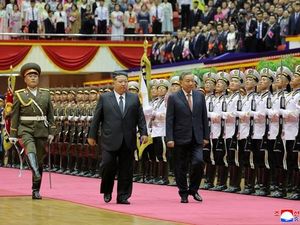The Vietnamese financial landscape stands on the brink of significant transformation this October, as two pivotal developments converge: the National Assembly Standing Committee’s (UBTVQH) expected decision to adjust personal income tax (PIT) family deductions, and the much-anticipated potential upgrade of Vietnam’s stock market status by FTSE Russell. These moves, rooted in years of economic growth and regulatory reform, are poised to reshape both the tax obligations of ordinary citizens and the prospects for foreign investment in the country’s capital markets.
For many Vietnamese households, the question of personal income tax has become increasingly urgent. Voters in Đồng Tháp province, reflecting broader public sentiment, recently called on the Ministry of Finance to review and revise the family deduction and PIT calculation thresholds. The core of their concern is clear: existing regulations no longer align with today’s price levels, incomes, and living standards. The cost of living has steadily risen, but the tax breaks that help families keep more of their earnings have not kept pace.
The legal framework for these deductions is defined by Clause 4, Article 1 of the PIT Law No. 26/2012/QH13. It stipulates that if the Consumer Price Index (CPI) rises by more than 20% compared to the law’s effective date or the last adjustment, the government must propose a new deduction level to the UBTVQH. According to the General Statistics Office, CPI increases have been steady: 3.23% in 2020, 1.84% in 2021, 3.15% in 2022, 3.25% in 2023, with a 3.63% rise in 2024 and a projected 4.5-5% for 2025. All told, the cumulative CPI from 2020 to the end of 2025 is expected to surpass 20%, landing at around 21.24%—a clear trigger for policy action.
In response, the Ministry of Finance has moved swiftly. As reported by Cafef, the ministry is drafting a resolution for the UBTVQH to adjust the family deduction, following legal procedures and seeking input from National Assembly delegations, ministries, localities, and organizations. The Ministry of Justice’s appraisal council reviewed the draft on September 11, 2025, marking an important step in the legislative process. The Ministry of Finance is also working on a broader amendment to the Personal Income Tax Law for the 15th National Assembly term. This draft law would empower the government to adjust deduction levels in line with shifting economic and social conditions and even considers adding new deduction categories, such as those related to health care and education.
Resolution No. 1326/NQ-UBTVQH15, dated December 23, 2024, sets the stage for these changes, and the 50th session of the UBTVQH, scheduled for October 2025, is expected to review and approve the new deduction levels. For millions of Vietnamese taxpayers, this could mean a tangible easing of their tax burden, helping their incomes stretch further amid rising prices.
While tax reform addresses the everyday concerns of citizens, the nation’s attention is also fixed on the international stage—specifically, the looming FTSE Russell decision on October 8, 2025. The global index provider is set to reveal whether Vietnam’s stock market will be upgraded, a move that could open the floodgates for foreign investment and signal Vietnam’s arrival as a more mature player in global finance.
At a recent third-quarter press conference, Deputy Minister of Finance Nguyen Duc Chi expressed confidence in Vietnam’s readiness for this upgrade. He explained, “Vietnam has been implementing multiple measures to develop a sustainable, stable, and transparent stock market.” The government’s strategy, he emphasized, is not just about meeting a checklist for foreign observers, but about building a market that can support the nation’s economic ambitions for the long haul.
Vietnam’s progress has been notable. As of FTSE Russell’s March 2025 review, the country met 7 out of 9 mandatory criteria and both non-mandatory criteria for an upgrade. The Ministry of Finance has since pushed through a series of reforms to address the remaining gaps. Circular 68, for example, now allows foreign institutional investors to buy stocks without having to fully fund their orders in advance—a move designed to facilitate smoother, more flexible investment flows. Meanwhile, Decree 245 amends the Securities Law to ensure that foreign investors aren’t unfairly limited by company charters or shareholder meeting decisions, aligning Vietnam’s rules with international commitments and best practices.
The State Bank of Vietnam has also played a role, issuing Circular 25 to streamline the process for foreign non-resident investors to open and use payment accounts for indirect investment. This regulation, effective from August 31, 2025, is seen as a decisive step in removing bureaucratic bottlenecks and making Vietnam’s markets more accessible to global capital.
According to analysts at Vietcap Securities, there is growing optimism that FTSE Russell will deliver good news for Vietnam. Should the upgrade go through, approximately 30 Vietnamese stocks could be added to the indices tracked by major investment funds, potentially attracting at least $1 billion in passive capital inflows. FTSE Russell’s screening process is rigorous, reviewing stocks quarterly based on minimum foreign ownership ratios, scale, liquidity, and free float. Any stock that falls short of these standards can be dropped from the index, ensuring only the most robust companies benefit from the upgrade.
Deputy Minister Nguyen Duc Chi was careful to note that the final call rests with the international organizations, but he stressed Vietnam’s ongoing commitment: “The upgrade is not a one-time goal, but a continuous process that must be maintained in the long term. The ultimate objective is to develop a stable, transparent stock market that effectively supports the economy, businesses, and the medium- and long-term capital markets.”
For Vietnam, these twin developments—reforming personal income tax and seeking a higher standing in global financial markets—are deeply intertwined. The government’s efforts to modernize tax policy and create a more attractive investment climate reflect a broader ambition: to ensure that economic growth translates into real benefits for both ordinary citizens and the nation as a whole.
With October 2025 shaping up to be a watershed month, all eyes are on the National Assembly and FTSE Russell. The decisions made in these forums will ripple through households and boardrooms alike, influencing everything from family budgets to the flow of international capital. For Vietnam, the stakes have rarely been higher—or the opportunities more promising.




